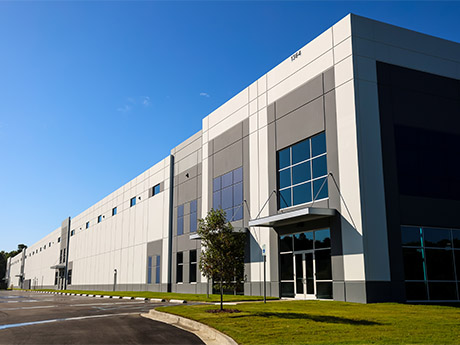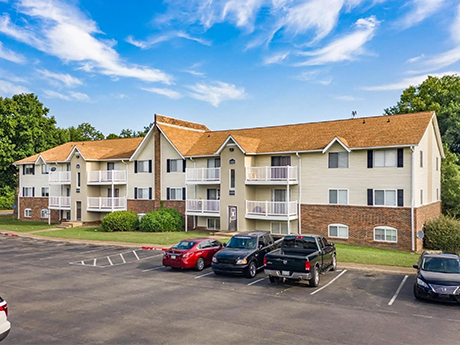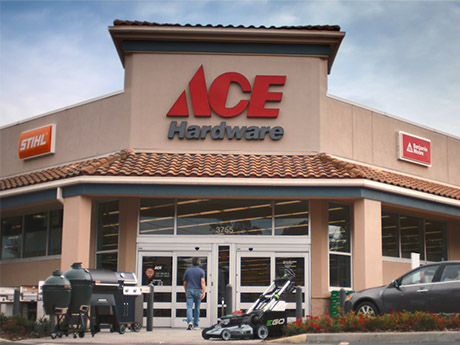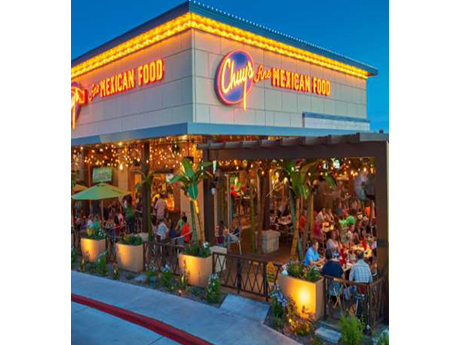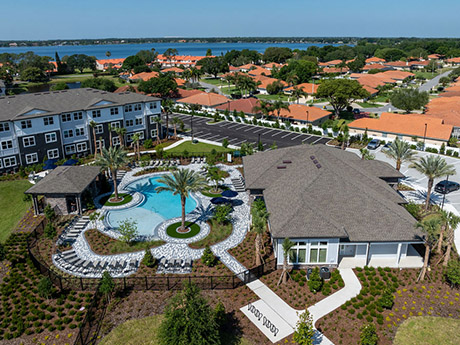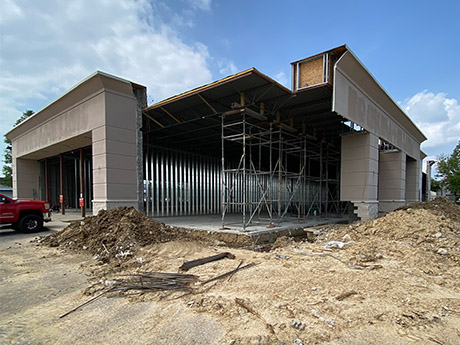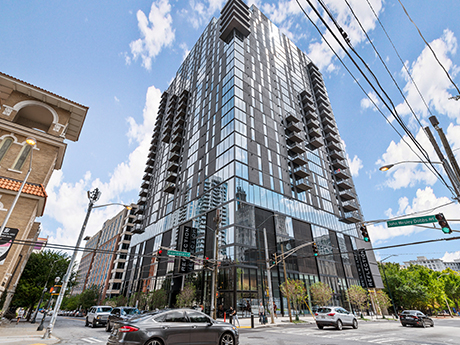BLYTHEWOOD, S.C. — Magnus Development Partners has completed Access 77, a 210,600-square-foot speculative industrial facility in Blythewood, a city near Columbia in Richland County. Situated near I-77, the property is located adjacent to the Scout Motors facility underway and within Northpoint Industrial Park, a county-owned park spanning 340 acres and housing companies including Coca-Cola, Constantia, Koyo and Spirax Sarco. Access 77 is a tilt-up facility that can house a single or multiple users. Features include a minimum clear height of 32 feet, 54- by 50-foot bay spacing, 130-foot truck court, LED lighting, trailer parking, 13 dock doors (expandable to 48) and two drive-in doors. Chuck Salley, Thomas Beard and John Peebles of Colliers are marketing Access 77 for lease.
Southeast
NASHVILLE, TENN. — Lion Real Estate Group (LREG) has acquired Bradford Woods, a 312-unit apartment community located at 5242 Edmondson Pike in Nashville. The seller and sales price were not disclosed. Walker & Dunlop’s Nashville office brokered the transaction, which included LREG assuming an existing Fannie Mae loan. LREG plans to rebrand the property as The Grove Brentwood and completely overhaul the leasing office/clubhouse, gym, pool area and all other onsite amenities. Additionally, the company plans to modernize unit interiors with stainless steel appliances, quartz countertops and upgraded lighting. The Grove Brentwood is LREG’s fourth acquisition in its current investment vehicle and 26th property overall in its portfolio that spans across five states.
ROSWELL, GA. — Hardware retail chain Ace Hardware has opened its 5,000th domestic store. Dubbed Fixit Ace Hardware, the store is located in Roswell, roughly 20 miles north of Atlanta. Additionally, the Oak Brook, Ill.-based retailer opened its 100th new store of the year in Henderson, Nev., last month. Ace Hardware, which operates more than 5,800 outposts globally, plans to open an additional 200 stores by the end of this year, which marks 100 years of business for the brand.
AUSTIN, TEXAS AND ORLANDO, FLA. — Darden Restaurants (NYSE: DRI) has agreed to acquire Chuy’s Holdings (NASDAQ: CHUY) for $605 million in an all-cash transaction. The Tex-Mex restaurant chain — which owns and operates 101 full-service restaurants across 15 states — will join Darden’s existing restaurant portfolio, which includes Olive Garden, LongHorn Steakhouse and Ruth’s Chris Steak House, among others. Under terms of the merger agreement, Orlando-based Darden will acquire all outstanding shares of Chuy’s at $37.50 per share. The purchase price represents a 40 percent premium to the Austin-based company’s 60-day volume weighted price. Chuy’s board of directors unanimously approved the merger agreement, which includes a 30-day “go-shop” period that will allow the company to solicit alternative proposals from interested parties. The transaction is expected to close during the second quarter of 2025, subject to a number of closing conditions, including approval by a majority of Chuy’s stockholders. Darden acquired Ruth’s Chris in summer 2023 for $715 million. The company’s portfolio of restaurant brands also includes Yard House, Cheddar’s Scratch Kitchen, The Capital Grille, Seasons 52, Eddie V’s and Bahama Breeze. Darden’s stock price closed at $147.35 per share on Thursday, July 17, down from $163.31 one year ago. …
Alliance Residential Delivers 324-Unit Prose Cypress Pointe Apartments in Winter Haven, Florida
by John Nelson
WINTER HAVEN, FLA. — Alliance Residential Co. has delivered Prose Cypress Pointe, a 324-unit apartment community located at 3110 Gowan Drive in Winter Haven. The property represents the fourth Prose-branded community in Central Florida for the Arizona-based developer. Situated 20 miles from Lakeland and 35 miles from Tampa, Prose Cypress Pointe features one- and two-bedroom apartments averaging 1,008 square feet in size. Monthly rental rates begin at $1,655, according to Prose Cypress Pointe’s property website. Amenities include a clubroom with an entertainment kitchen, business center with coworking spaces, 24/7 package access via a Parcel Pending package locker, 24-hour fitness center, fenced pet park, resort-style pool with a tanning ledge and in-pool lounge seating, gas grill stations and a poolside entertainment cabana with an outdoor TV and lounge seating.
Ziegler Arranges $76.2M Bond Financing for Seniors Housing Community in Chapel Hill, North Carolina
by John Nelson
CHAPEL HILL, N.C. — Ziegler has arranged $76.2 million in bond financing for Carolina Meadows, a continuing care retirement community (CCRC) in Chapel Hill, part of the Raleigh-Durham metropolitan area. Carolina Meadows was formed in 1983 to develop, own and manage the community. The property features 476 independent living units, 78 assisted living units (95 beds in operation) and 78 skilled nursing units (86 beds in operation). This ranks Carolina Meadows as the 20th largest nonprofit, single-site CCRC in the country, according to the 2023 LeadingAge-Ziegler 200. Carolina Meadows plans to develop, own and operate a replacement nursing facility that will total approximately 122,000 square feet. The project will bring a progressive new care model to Carolina Meadows and will include a total of 90 beds, comprised seven 12-person households with the possibility of dual-occupancy in one unit in six of the households. Each unique household is designed to resemble a home, and include a living room, kitchen, den and direct access to outdoor spaces. Upon completion of the project, which is scheduled for April 2026, Carolina Meadows will transfer residents from its existing health center to the new health center.
FORT MYERS, FLA. — JBM Institutional Multifamily Advisors has brokered the $57 million sale of Brantley Pines, a 296-unit apartment community situated on 29.1 acres in Fort Myers. The Inland Real Estate Group of Cos. sold the Southwest Florida property to Boca Raton, Fla.-based Interface Properties for $192,568 per unit. Interface plans on continuing a renovation program for the unit interiors at Brantley Pines while also adding a lakeside walking path and enhancing the clubhouse, pool area and landscaping. The previous owner recently added pickleball courts to Brantley Pines, which was delivered in two phases in 1988 and 1997.
Campbell County Economic Development to Build 100,000 SF Industrial Facility in Central Virginia
by John Nelson
RUSTBURG, VA. — Campbell County Economic Development plans to develop a 100,000-square-foot industrial facility in Rustburg, a city in central Virginia. The $11 million project will be situated on 7.5 acres within Seneca Commerce Park along U.S. Route 29 and Wards Road. The facility represents the largest undertaking for the department in a decade. The design and oversight of the construction project is currently being procured by Campbell County Economic Development, with site development scheduled to be advertised for bidding in the fall. The selected architect and engineering firms will work with the county to design the building and provide ongoing construction management throughout the project. The Tobacco Regional Revitalization Commission has awarded grant funding for the site, which has also been recommended for funding by the Southeast Crescent Regional Commission. The projected timeline has the tenant-ready building delivering in spring 2026.
LAFAYETTE, LA. — GBT Realty Corp. has executed leases with new retailers at River Marketplace, a 168,000-square-foot shopping center in Lafayette. J. Crew Factory, Sephora and lululemon have signed leases to occupy a freestanding, 16,700-square-foot building within the shopping center that once housed Books-A-Million, which shuttered earlier this year. All three retailers are expected to open in early 2025. A final 3,450-square-foot space remains available for lease in the building. Situated on a 43-acre site, River Marketplace is anchored by a Super Target. The property is currently 99 percent leased to tenants including Ross Dress for Less, Total Wine & More, Rack Room Shoes, Cato, 2nd & Charles, Toasted Yolk Café, Buckle, Crumbl Cookies and Games Workshop.
ATLANTA — Newmark has brokered the sale of Reflection, a student housing high-rise in Midtown Atlanta totaling 741 beds across 247 units. The Class A property is located at 111 John Wesley Dobbs Ave. NE, which is within walking distance of Georgia State University. Ryan Lang, Jack Brett, Ben Harkrider and Bert Sanders of Newmark represented the sellers, Atlantic Capital Properties and ELV Associates, in the transaction. The Scion Group and Brookfield Asset Management purchased the property for an undisclosed price. Built in 2022, Reflection features bed-to-bath parity, designer furniture package, stainless steel appliances and in-unit washers and dryers. Community amenities include a temperature-controlled saltwater pool with in-water tanning loungers, a jumbotron screen on an elevated deck, outdoor lawn and grilling area, fitness center, modern study and conference spaces and designated entertainment rooms that include gaming systems and table games. Additionally, the property features two retail spaces leased to Center Parc Credit Union and Mochinut, a donut shop. Reflection was 99.6 percent occupied at the time of sale.


